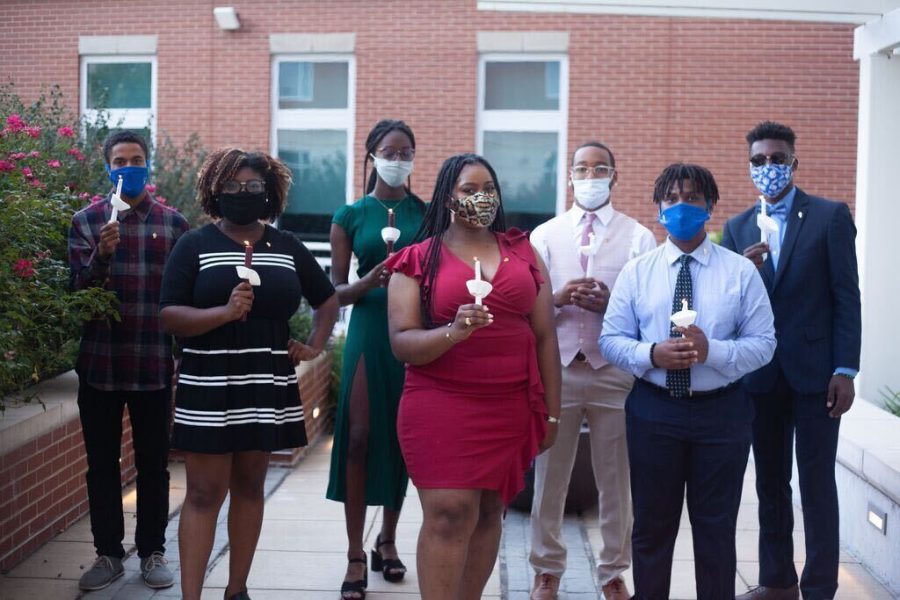The Inception of Thrive: A Learning Community for Black SLU Students
The Next Step in SLU’s Journey Towards Social Equity
Saint Louis University, an institution with a long history of racial injustice, including once owning enslaved people, is seeking to take a new step towards social equity on campus by providing a safe space for Black students residing on campus.
Thrive, a new learning community introduced to campus this semester, aims to provide a live-in space for Black SLU students where they can learn and grow together.
“Thrive is a place where African American students can feel like they have a place to belong on campus,” says Kenya Reeves, who serves as a peer mentor for the community. “We try our best to uplift each other to reach the goals that we have set for ourselves.”
This year has been one of social awakening for many Americans, regardless of their race. As a result, there is now widespread recognition of the work that still needs to be done to rid American society of racism. Juxtaposed within this broader social context, Thrive’s goal is to ultimately equip Black students with the tools they need to succeed personally and professionally—whether that be networking skills, providing help navigating America as a person of color, or building a community that they can truly thrive in.
The murder of George Floyd has similarly shed light on the systemic inequalities that Black Americans face simply for living in the United States. Only 34 percent of all Black applicants to SLU are admitted, according to the SLU Office of Admissions. Overall, SLU admitted 56 percent of all freshman applicants for the Fall 2020 semester.
These statistics highlight the challenges Black Americans face in the college admissions process, and, as a result, in obtaining access to higher education. Even those that beat the odds and get admitted handle the challenges of being a college student while still facing discrimination and isolation because of their race.
That’s where Thrive comes in. Originally conceived by SLU Director of Housing and Residence Life Manisha Ford-Thomas, Thrive started this year with the goal of becoming a space where Black SLU students could grow alongside one another.
“The learning community is designed to help students deepen their cultural understanding and awareness of the Black experience and develop the skills and tools to address institutional and societal change,” said Ford-Thomas. “Looking ahead, we hope to deepen and grow student, staff, and faculty relationships in support of all residential students.”
Thrive is like other learning communities at SLU, in that it has a set of requirements for its members to get the most out of their experience. Thrive residents are required to complete 10 service hours, participate in 10 faculty floor events, take a Thrive-oriented University 101 course and take an African-American Studies course on being Black in America. Members who complete these requirements receive a medallion to wear at graduation.
“What I really enjoy about being an RA in Thrive is being able to connect my residents with resources specifically catered to them,” said Faith Nixon, Residential Advisor for the learning community.
Nixon believes that, due to SLU’s demographics, campus resources and services are typically catered to white students. Armed with knowledge of alternate resources geared specifically toward African-Americans, Nixon is able to reach out and help her residents with their needs in a personalized and effective way.
Nixon and Reeves have also sought to start traditions unique to Thrive. According to Nixon, traditions play a huge role in African culture. By creating traditions like an annual candlelight ceremony, she hopes to bring a little slice of the culture to her community.
Additionally, both leaders also hope to bring in speakers from the SLU Black Alumni Association, which will give their residents some professional perspective about being a Black American in the working world. These events will also provide a valuable opportunity for students to network with alumni who understand their personal and academic struggles as Black students.
The future of Thrive is unknown, but promising. The COVID-19 pandemic has brewed uncertainty among university administrators and students alike, and it has certainly prevented Thrive from fully living up to Ford-Thomas’ original vision. Still, Nixon and Reeves have high hopes that the traditions and practices they’ve started will continue to be passed down to future leaders and members of Thrive.
“Knowing something has been passed down and curated from the class before you is an important thing in most cultures,” says Reeves. “This will create a strong bond for the Thrive community.”
Your donation will support the student journalists of Saint Louis University.






Jakob Benedetti • Oct 26, 2020 at 4:21 pm
Hey Conor,
Not that it’s relevant in any conceivable way, but I saw what you wrote in the WSJ about the Supreme Court, and I just gotta say I totally agree with everything you said there. You really hit the nail on the head. Also, this is a great article. Keep up the great work.
Mike • Oct 21, 2020 at 2:33 pm
Conor Van Santen wrote the below in the WSJ opinion pages.
“If Amy Coney Barrett’s nomination to the Supreme Court is confirmed, the Democrats should add a justice or two to the bench. Republicans set a precedent in 2016 when they refused to hold a hearing during an election year on President Obama’s nominee to the high court, Merrick Garland. Mitch McConnell held off on a vote for nine months. By holding hearings now, only a few weeks before the election, the Senate majority leader is showing that he always regarded the Supreme Court as a political instrument. He played politics with it in 2016 and he’s playing politics with it now. If Republicans choose to place partisanship over prece-dent, then Democrats have every right to do the same.”
Conor, you don’t give the WSJ subscribers enough credit. Oh how may count the ways the Democrats play and play politics with the Supreme Court?
You’re young and naive Conor. Before a statement like Republicans are playing politics with SCOTUS, make sure you understand your darling Democrat party and how they played politics with SCOTUS throughout the nations history. And yeah….McConnell played politics. Duh!